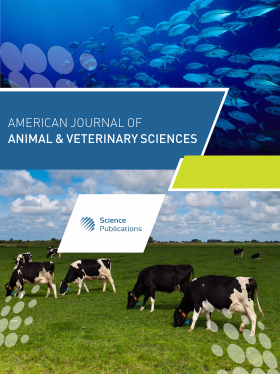Cryptosporidiosis in Ruminants: Update and Current Therapeutic Approaches
- 1 Adnan Menderes University, Turkey
Abstract
Cryptosporidium species causes asymptomatic or mild to severe gastrointestinal disease in their broad range of host species. These host species include humans, domestic and wild animals worldwide. The importance of cryptosporidiosis in ruminants has been emphasised in recent years for not only mortality, delayed growth and economic losses in the farm but also zoonotic importance. So more than 200 substances have been tested against cryptosporidiosis, but none of them was able to eliminate the infection consistently. This article will focus on therapeutic interventions in neonatal ruminants against cryptosporidiosis including perspectives for new drugs.
DOI: https://doi.org/10.3844/ajavsp.2017.96.103

- 6,840 Views
- 7,409 Downloads
- 10 Citations
Download
Keywords
- Cryptosporidium
- Calf
- Lamb
- Kid
- Treatment
